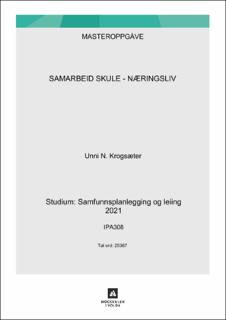| dc.contributor.advisor | Folkestad, Bjarte | |
| dc.contributor.author | Krogsæter, Unni Merethe Nerås | |
| dc.coverage.spatial | Norway | en_US |
| dc.date.accessioned | 2021-07-19T09:34:09Z | |
| dc.date.available | 2021-07-19T09:34:09Z | |
| dc.date.issued | 2021 | |
| dc.identifier.uri | https://hdl.handle.net/11250/2764747 | |
| dc.description.abstract | Samandrag Temaet i denne masteroppgåva er samarbeid mellom grunnskule og næringsliv. Og problemstillinga er som følgjer; Korleis arbeider grunnskulane med å få til eit konstruktivt samarbeid med næringslivet i lokalsamfunna sine? Temaet er aktuelt fordi elevane som skulen har i dag skal ut i eit arbeidsliv vi ikkje heilt veit korleis det vil sjå ut om nokre år. Arbeidsmarknaden er stadig i endring og skulen må følgje med på kva næringslivet i lokalsamfunna vil trenge om nokre år.
Formålet med denne oppgåva er å avdekke kva for faktorar som er med å styrke eit samarbeid mellom grunnskule og næringsliv og på denne måten legge til rette for eit konstruktivt samarbeid som alle partar kan finne gjevande. Bedriftene treng rekruttering og skulen treng ein fysisk arena å vise elevane kva for moglegheiter som finnast i lokalmiljøet for å gjere sikrare val når dei skal velge linje på vidaregåande skule. Då er det viktig at ein brukar tid og ressursar i grunnskulen.
Oppgåva har brukt kvalitativ metode i tilnærminga si til temaet for å avdekke kva for erfaringar dei ulike informantane sit med, og kva faktorar som er viktig i eit samarbeid mellom grunnskule og næringsliv.
Ein gjennomgang av litteratur til dette temaet viste seg at ein del var skrive om samarbeid mellom vidaregåande skule og næringsliv, og heller lite om grunnskule, men ein kan ha ei antaking om at mykje av den litteraturen kan ha relevans for grunnskulen òg.
Dei faktorane som kom fram var at ein treng eldsjelene som kan å prate med ungdom, dette var uavhengig av om ein hadde formaliserte avtaler eller ikkje. Og at det ikkje var så viktig at avtalar var formaliserte, ein del meinte at det vart meir dynamisk å gjere avtalar frå år til år. Likevel så erfarte eine kommunen at den formalisert avtalen kunne ha ført til ei større søking til særskilte linjer på vidaregåande skule. Det kom òg fram at det var viktig med forankring, heilt frå kommuneleiing til dei lærarane som skulle gjennomføre dette samarbeidet i praksis. Dette kunne føre til ei betre gjennomføring for alle parter. Lokalsamfunnet spelar ei rolle og det kan synast at mindre lokalsamfunn med eit tettare nettverk har ein større sjanse til å få til eit godt og konstruktivt samarbeid med bedriftene i området. | nn_NO |
| dc.description.abstract | Summary The theme for this master’s thesis is cooperation between schools and local businesses. The research question is as follows: How do schools work towards a constructive cooperation with businesses in their local communities? This subject is relevant because the pupils that are in school today are going into different lines of work that we do not quite know what will look like in a few years.
The labour market is constantly changing and schools need to keep up with what the local businesses will need in a few years. The purpose of this thesis is to find what factors are needed to strengthen cooperation between schools and businesses and by this facilitate a constructive cooperation that all parties can benefit from. The businesses need to recruit workers and schools need a place to show pupils what possibilities there are in the local community to make them more certain in their choice of education in upper secondary school. Therefore it is important to use both time and resources in primary school.
This thesis has used qualitative research to uncover the different experiences amongst the different respondents, and what factors are important for cooperation between primary school and businesses.
A review on literature connected to this subject showed a lot of works on cooperation between upper secondary school and businesses, and rather few regarding primary school, but one can assume that this literature could be relevant for primary schools as well.
Those factors that were revealed were the need for people that would speak to the young, regardless of formalized agreements or not. And that formalized agreements were not so important, but rather more dynamic, year-to-year agreements. However, one municipality experienced that the formalized agreement could have resulted in an increase of applicant to certain courses in upper secondary school. Another factor that was revealed was that everyone from the municipal management to the teachers that would have to go through with this cooperation. This could lead to better implementation for all parties. The local community plays a part in all this and it appears that a smaller community with closer ties seems to have a greater opportunity for a good and constructive cooperation with local businesses | en_US |
| dc.language.iso | nno | |
| dc.publisher | Høgskulen i Volda | nn_NO |
| dc.title | Samarbeid skule - næringsliv | en_US |
| dc.title.alternative | ; Korleis arbeider grunnskulane med å få til eit konstruktivt samarbeid med næringslivet i lokalsamfunna sine? | en_US |
| dc.title.alternative | How do schools work towards a constructive cooperation with businesses in their local communities? | en_US |
| dc.type | Master thesis | en_US |
| dc.rights.holder | forfattaren | nn_NO |
| dc.subject.nsi | VDP::Samfunnsvitenskap: 200::Statsvitenskap og organisasjonsteori: 240::Offentlig og privat administrasjon: 242 | en_US |
| dc.subject.nsi | VDP::Samfunnsvitenskap: 200::Pedagogiske fag: 280::Andre pedagogiske fag: 289 | en_US |
| dc.source.pagenumber | 83 | en_US |
